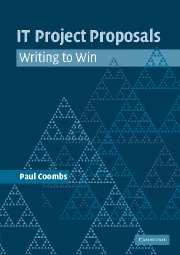Book contents
- Frontmatter
- Contents
- Microsoft Word
- Chapter 1 Introduction
- Chapter 2 Establishing the strategy
- Chapter 3 Choosing the content
- Chapter 4 Structuring the proposal
- Chapter 5 Tightening up the text
- Chapter 6 Obeying the grammar rules
- Chapter 7 Obeying the punctuation rules
- Chapter 8 Finishing off
- Chapter 9 Reviewing the result
- Chapter 10 Summary
- Appendix A The Document Standard
- Appendix B Select bibliography and resources
- Appendix C Case studies
- Index
Chapter 6 - Obeying the grammar rules
Published online by Cambridge University Press: 11 August 2009
- Frontmatter
- Contents
- Microsoft Word
- Chapter 1 Introduction
- Chapter 2 Establishing the strategy
- Chapter 3 Choosing the content
- Chapter 4 Structuring the proposal
- Chapter 5 Tightening up the text
- Chapter 6 Obeying the grammar rules
- Chapter 7 Obeying the punctuation rules
- Chapter 8 Finishing off
- Chapter 9 Reviewing the result
- Chapter 10 Summary
- Appendix A The Document Standard
- Appendix B Select bibliography and resources
- Appendix C Case studies
- Index
Summary
DOES GRAMMAR MATTER?
My knuckles still feel a ghostly pain whenever I break the writing rules beaten into me at what, significantly, was called a “grammar” school. In those days, grammar did matter. Perfect prose carried more weight because it instantly indicated that the writer was “one of us” – someone who understood the rules and hence was to be trusted. Some remnants of that attitude persist. There are still some people who, should they encounter a split infinitive or some other manifestation of incorrect grammar, immediately bin the offending text. Others may decide that the writer is only semi-literate, but will soldier on, being convinced more by the arguments than by a failure to obey some arcane rule. But, whoever the readers may be, we don't want to interrupt their understanding of our world-beating technical solution with something that makes them pause, wondering if they have read it right.
Unfortunately, when you ask most people if they know any rules of grammar, they will come up with something trivial. In fact, most of the rules you think you know are wrong: you can split an infinitive, end a sentence with a preposition or start one with a conjunction. In this chapter, I will show why. But those rules don't matter; the situations where they arise are rare, and the resulting English is not so bad anyway.
- Type
- Chapter
- Information
- IT Project ProposalsWriting to Win, pp. 72 - 87Publisher: Cambridge University PressPrint publication year: 2005



